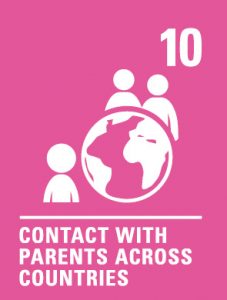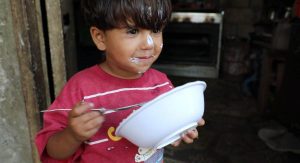 According to the first executive director of the World Food Program (WFP), Addeke Boerma, “If human beings have a right to life at all, they have a right to food.” The Committee on Economic, Social and Cultural Rights recognizes that “the right to adequate food is realized when every man, woman and child, alone or in community with others, has physical and economic access at all times to adequate food or means for its procurement.”
According to the first executive director of the World Food Program (WFP), Addeke Boerma, “If human beings have a right to life at all, they have a right to food.” The Committee on Economic, Social and Cultural Rights recognizes that “the right to adequate food is realized when every man, woman and child, alone or in community with others, has physical and economic access at all times to adequate food or means for its procurement.”
Almost half of Palestine’s population needs humanitarian assistance, and one-quarter of the population needs food, nutrition, and livelihood assistance. The main reason for food insecurity in Palestine is the longstanding occupation, which restricts people’s access to their land, water, and other natural resources. The occupation also enforces territorial fragmentation between the West Bank and Gaza Strip as well as within the West Bank, resulting in high unemployment and poverty, and hence people’s limited access to adequate food.
Although many groups in Palestine that face the danger of malnutrition need to be protected, children should be the priority, given that children are powerless and need others to take care of them. Protecting children’s food security, nutrition, and well-being is a valuable and effective investment in the health of future generations. Child malnutrition, however, is a growing problem in Palestine.
Article 24 (3) of the Convention on the Rights of the Child (CRC) states that children are entitled to adequate and nutritious food, thereby making state parties to the CRC, including Palestine and Israel, accountable to preserving and achieving this fundamental right.

Access to adequate food is a major challenge for Palestine’s vulnerable people. As a WFP staff member, I visit households all over Palestine and witness firsthand their distress and poverty. One of the families I visited in Yatta in southern Hebron consisted of the parents and eight children. Seven children are under the age of eighteen years, and the eldest, who suffers from a severe physical disability and uses a wheelchair, is twenty years old. The family’s economic situation is devastating. The father is unemployed and has a neurological disease, which leaves the burden on the wife to raise the children by any means possible. She has no source of income from which to provide her family with basic nutritious food. For this reason, the family is registered as a social hardship case in the Ministry of Social Development and receives modest financial assistance through the ministry’s cash assistance program and monthly food assistance from the WFP through its cash-based transfer program.
Despite numerous attempts to gain employment, the father has not been able to find a job. “We live in a very difficult situation, and if the food assistance stops, we don’t know how we will feed our children,” the wife explained. The eldest son jumped into the conversation: “I would like to have an opportunity to open a grocery store and support my family.”
There are tens of thousands of families in Palestine that experience similar socio-economic hardships, and many families are in an even worse situation. The question, then, is who is responsible to protect Palestinian children from hunger and malnutrition? What steps can be taken by the local community, the government, and the international community to respond to this need, and what should they do to combat poverty and food insecurity in order to spare Palestine’s vulnerable children additional distress and build them a brighter future?

The responsibility to protect the rights of Palestine’s children and ensure that they are adequately fed rests on various actors. The parents are the ones who are primarily responsible to adequately nourish their children. However, this cannot be achieved without the support of the local community, civil society, the Palestinian government, and the international community, including international nongovernmental organizations.
A key obstacle to realizing children’s right to adequate and nutritious food in Palestine lies in the limited and overstretched budget of the government, which undermines its ability to provide comprehensive and adequate social services to every family in need of assistance. The substantial decline in external aid has also undermined the government’s social safety-net programs as well as the capability of international organizations to respond appropriately to the existing urgent food and nutrition needs.
Ensuring that Palestine’s children have access to adequate and nutritious food requires a holistic response that can lead to a major transformation in the political, economic, and social conditions of Palestinians. In this vein, it is essential to empower government institutions, local communities, and families through multiple forms of assistance. Furthermore, the proper environment and resources are requisite to the launching of development, resilience, and income-generating projects which could pull vulnerable families out of poverty and end their dependency on assistance. As long as the Palestinian government does not enjoy full sovereignty over food resources, however, the right of children in Palestine to have adequate and nutritious food will remain unfulfilled.


